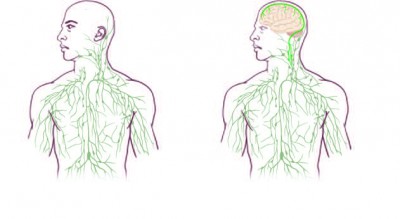“They’ll have to change the textbooks.” That’s what Kevin Lee, PhD, chairman of the UVA Department of Neuroscience, said when he first saw the research.

He wasn’t wrong. An exciting new discovery has completely changed how we perceive disease in the brain: Researchers found previously undetected vessels connecting the brain to the immune system. The finding has major implications for research in neurological diseases such as autism, Alzheimer’s and multiple sclerosis.
“I really did not believe there are structures in the body that we are not aware of. I thought the body was mapped,” says Jonathan Kipnis, PhD, neuroscience professor and director of UVA’s Center for Brain Immunology and Glia (BIG). “I thought that these discoveries ended somewhere around the middle of the last century. But apparently they have not.”
Although researchers knew there was a connection between the brain and immune system, they always thought of it as “something esoteric that can’t be studied,” Kipnis says. Now, he and his colleagues believe the vessels play a major role.
The vessels are “very well hidden,” Kipnis explains, and are in an area that’s difficult to get images of, which is why nobody noticed them before.
The discovery means many new angles to explore when researching neurological disease. For example, people with Alzheimer’s have chunks of protein accumulating in their brains. Researchers now suspect these immune system vessels may be the culprits.